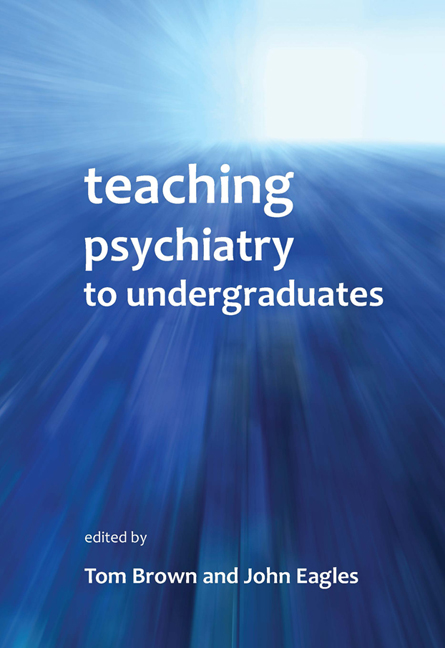Book contents
- Frontmatter
- Contents
- List of figures, tables and boxes
- List of contributors
- Preface
- Foreword
- 1 How do students learn?
- 2 Recent developments in undergraduate medical education
- 3 Undergraduate psychiatry teaching – the core curriculum
- 4 The organisation of undergraduate teaching
- 5 Assessment of undergraduates in psychiatry
- 6 Using computers to teach undergraduate psychiatry
- 7 How to give a lecture
- 8 How to do small-group teaching
- 9 Problem-based learning
- 10 Teaching trainee psychiatrists how to teach medical students: the Southampton model
- 11 Involving trainees in teaching
- 12 Involvement of service users in psychiatric education
- 13 Time-efficient clinical teaching
- 14 Intercalated degrees
- 15 Undergraduate experiences of psychiatry: a student view
- 16 Integration: teaching psychiatry with other specialties
- 17 Teaching the teachers in a cross-cultural setting: the Scotland–Malawi Mental Health Education Project
- 18 International undergraduate teaching
- 19 Teaching with simulated patients and role-play
- 20 Undergraduate medical education and recruitment to psychiatry
- 21 Choosing psychiatry: factors influencing career choice among foundation doctors in Scotland
- 22 Funding of the teaching of medical undergraduates
- 23 Dealing with students in difficulty
- 24 Training medical students to promote good mental health in secondary schools
- 25 Women in medicine
- Index
6 - Using computers to teach undergraduate psychiatry
- Frontmatter
- Contents
- List of figures, tables and boxes
- List of contributors
- Preface
- Foreword
- 1 How do students learn?
- 2 Recent developments in undergraduate medical education
- 3 Undergraduate psychiatry teaching – the core curriculum
- 4 The organisation of undergraduate teaching
- 5 Assessment of undergraduates in psychiatry
- 6 Using computers to teach undergraduate psychiatry
- 7 How to give a lecture
- 8 How to do small-group teaching
- 9 Problem-based learning
- 10 Teaching trainee psychiatrists how to teach medical students: the Southampton model
- 11 Involving trainees in teaching
- 12 Involvement of service users in psychiatric education
- 13 Time-efficient clinical teaching
- 14 Intercalated degrees
- 15 Undergraduate experiences of psychiatry: a student view
- 16 Integration: teaching psychiatry with other specialties
- 17 Teaching the teachers in a cross-cultural setting: the Scotland–Malawi Mental Health Education Project
- 18 International undergraduate teaching
- 19 Teaching with simulated patients and role-play
- 20 Undergraduate medical education and recruitment to psychiatry
- 21 Choosing psychiatry: factors influencing career choice among foundation doctors in Scotland
- 22 Funding of the teaching of medical undergraduates
- 23 Dealing with students in difficulty
- 24 Training medical students to promote good mental health in secondary schools
- 25 Women in medicine
- Index
Summary
Introduction
Medical students’ time is precious; they have a lot to learn. As psychiatrists, we are inclined to think psychiatry is a crucial part of the undergraduate course. We also have an important role to play in helping students to develop communication skills with vulnerable people – a key task identified by the General Medical Council in Tomorrow's Doctors (2003). Many of the ‘facts’ will change in the course of their careers, so as well as providing training in specific skills, and providing positive role models as clinicians, our role as medical teachers should include laying down strategies for knowledge to sustain the capacity for new learning. This chapter will address the areas in which information technology can assist, and where it might be an irrelevance, or even a costly distraction.
We realise that many medical teachers will come to this topic with an appropriately sceptical eye. We have all seen computer projects start out promising to change everything, but then failing miserably. E-learning can be as simple or as complex as you need it to be – the key is to ask yourself and your colleagues the right questions before getting stuck in.
Why bother with e-learning?
The ‘e’ in e-Learning stands for education – we too often forget that – it is not about bandwidth, servers, and cables. It is about education – first and foremost (Gaines, 2004).
Information technology (IT) is only an educational medium, namely a means of delivering an experience which can encourage learning. Its success is predicated on the use of established teaching methods: taking students from the known to the unknown, clearly delivering the relevant content, and checking their understanding (Chan & Robbins, 2006). Consider first what you want the students to be able to do after the activity or, from the learner's perspective, consider how any one particular lesson will help them accomplish their goal of being a good doctor. One of the long-established principles of e-learning is that however much work the developer puts in, the only real value lies in users performing their role better afterwards (Kirkpatrick, 1998).
- Type
- Chapter
- Information
- Teaching Psychiatry to Undergraduates , pp. 66 - 84Publisher: Royal College of PsychiatristsPrint publication year: 2011



